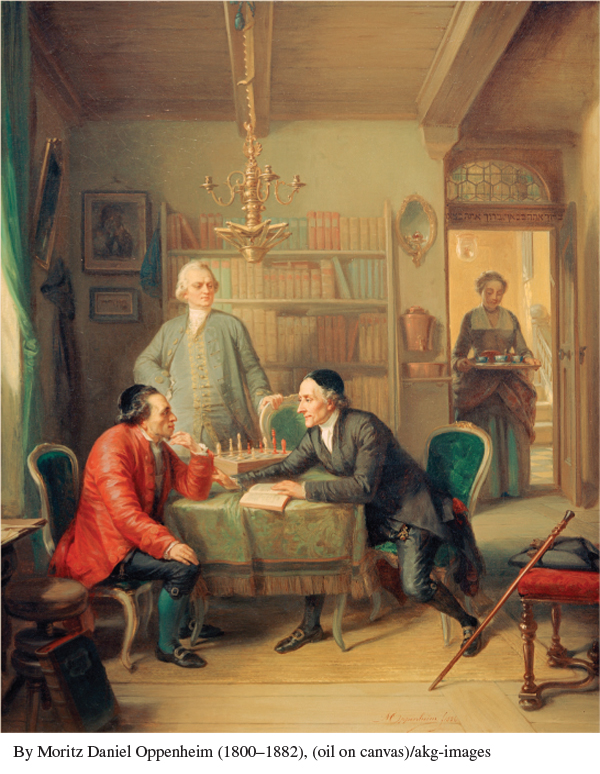A History of Western Society: Printed Page 537
A History of Western Society, Concise Edition: Printed Page 538
Individuals in Society
Moses Mendelssohn and the Jewish Enlightenment
I n 1743 a small, humpbacked Jewish boy with a stammer left his poor parents in Dessau in central Germany and walked eighty miles to Berlin, the capital of Frederick the Great’s Prussia. According to one story, when the boy reached the Rosenthaler (ROH-
In Berlin the young Mendelssohn studied Jewish law and eked out a living copying Hebrew manuscripts in a beautiful hand. But he was soon fascinated by an intellectual world that had been closed to him in the Dessau ghetto. There, like most Jews throughout central Europe, he had spoken Yiddish — a mixture of German, Polish, and Hebrew. Now, working mainly on his own, he mastered German; learned Latin, Greek, French, and English; and studied mathematics and Enlightenment philosophy. Word of his exceptional abilities spread in Berlin’s Jewish community (the dwelling of 1,500 of the city’s 100,000 inhabitants). He began tutoring the children of a wealthy Jewish silk merchant, and he soon became the merchant’s clerk and later his partner. But his great passion remained the life of the mind and the spirit, which he avidly pursued in his off-
Gentle and unassuming in his personal life, Mendelssohn was a bold thinker. Reading eagerly in Western philosophy since antiquity, he was, as a pious Jew, soon convinced that Enlightenment teachings need not be opposed to Jewish thought and religion. He concluded that reason could complement and strengthen religion, although each would retain its integrity as a separate sphere.† Developing his idea in his first great work, On the Immortality of the Soul (1767), Mendelssohn used the neutral setting of a philosophical dialogue between Socrates and his followers in ancient Greece to argue that the human soul lived forever. In refusing to bring religion and critical thinking into conflict, he was strongly influenced by contemporary German philosophers who argued similarly on behalf of Christianity. He reflected the way the German Enlightenment generally supported established religion, in contrast to the French Enlightenment, which attacked it.
Mendelssohn’s treatise on the human soul captivated the educated German public, which marveled that a Jew could have written a philosophical masterpiece. In the excitement, a Christian zealot named Johann Casper Lavater challenged Mendelssohn in a pamphlet to demonstrate how the Christian faith was not “reasonable” or to accept Christianity. Replying politely but passionately, the Jewish philosopher affirmed that his studies had only strengthened him in his faith, although he did not seek to convert anyone not born into Judaism. Rather, he urged toleration in religious matters and spoke up courageously against Jewish oppression.

Orthodox Jew and German philosophe, Moses Mendelssohn serenely combined two very different worlds. He built a bridge from the ghetto to the dominant culture over which many Jews would pass, including his novelist daughter Dorothea and his famous grandson, the composer Felix Mendelssohn.
QUESTIONS FOR ANALYSIS
- How did Mendelssohn seek to influence Jewish religious thought in his time?
- How do Mendelssohn’s ideas compare with those of the French Enlightenment?